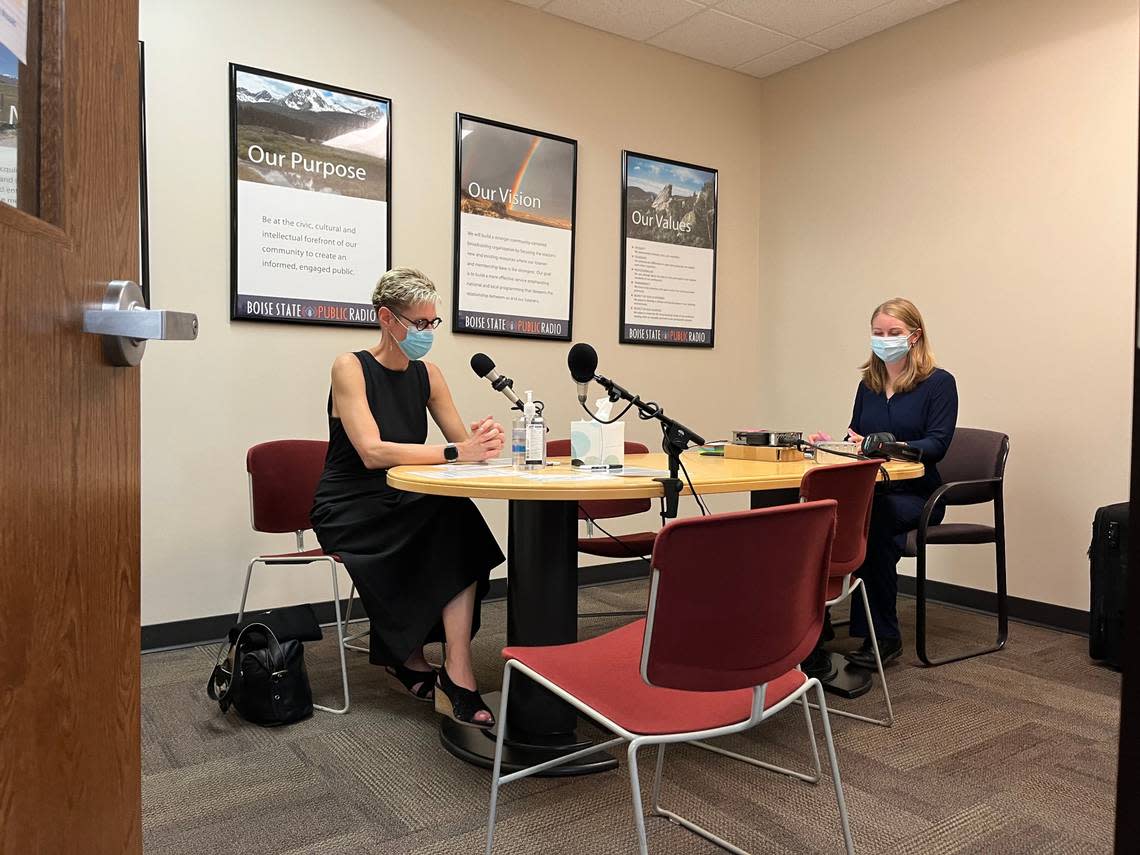Want your story to be in the Library of Congress? An organization visiting Boise can help
Sitting in a fairly nondescript room inside Boise State Public Radio’s office building, Boise State University President Marlene Tromp prepared herself in front of a microphone. She faced a facilitator at the end of the table and looked down at a list of over 40 questions:
Are you afraid of dying?
Have you experienced any miracles?
Do you have any regrets?
They’re certainly not softball questions. But they’re the sort of inquiries that can lead to a conversation between two people that, with permission of the participants, be stored in the American Folklife Center at the Library of Congress for future generations to hear.
Snippets of the best conversations will be aired on Boise’s NPR station. The recordings are part of an oral history project called StoryCorps, which travels around the United States to record meaningful conversations between loved ones while giving underrepresented or misrepresented communities the chance to amplify and preserve their voices.
The project is in its 17th year and was created by award-winning radio producer David Isay, with the goal of providing an “authentic American story.”
“We hope to create better understanding across communities. And we strongly believe in the power of listening,” Teriyana Morton, site manager for the StoryCorp mobile tour, said Thursday. “Just think about it. How often do you sit down with someone you love, turn off your phone, shut off the outside world and ask more significant questions?”
Morton stood in front of a large metal trailer with “StoryCorps” lavishly painted on the side in red. Wherever StoryCorps goes, the trailer goes, too.
But the interviews take place inside a nearby building; in this case, Boise State Public Radio.
StoryCorps has been to Boise before — most recently in May 2020 as a virtual tour because of the COVID-19 pandemic — and will be stationed in the City of Trees through Sept. 2.
Tromp was the first person to sit down for a conversation this time around, entering the booth on Thursday morning. Typically two people sit and talk to each other as a facilitator watches on and occasionally asks questions; Tromp was supposed to speak with her mother and brother, but both became unavailable, meaning she chatted directly to the facilitator.

Once the conversation started, the door to the booth closed. Anyone wanting to hear what Tromp had to say will have to wait for it to be submitted to the Library of Congress or partly aired on Boise State Public Radio.
But before sitting down to talk about her life, Tromp spoke a few words about the importance of the project.
“My whole career has been built around stories,” Tromp said. “And the way we tell stories and the impact that it has on not just ourselves to tell the story, but on the whole world around us.
“I think right now we need each other’s stories more than we ever have before,” she continued. “The kind of division that has often fractured neighbor from neighbor or community from community has made it so difficult for us to hear or see one another in ways that reveal all of our true humanity. StoryCorps is a powerful antidote to that kind of division.”
What is participating in StoryCorps like?
There may be a list of questions on the table, but Morton describes the process as more of a conversation than an interview.
Most conversations are between two people who know each other, and StoryCorps helps produce a meaningful discussion between the pair about topics they may not have broached before. StoryCorps is also willing to allow people to come in for a session alone, similar to what Tromp wound up doing.
“If someone doesn’t have someone to talk to, one of the other facilitators or I will be able to sit in with them and ask them questions,” Morton said. “Or if they have something specific they want to talk about, we’ll gear our questions towards that.”
Conversations typically last about 40 minutes but can be cut short if the participants feel they’re done. For discussions with two people, the facilitator mostly likely will remain quiet — but interject with questions about inside jokes or nicknames so listeners later on have some context.
Common themes include love stories or family history, Morton said, but ultimately it’s down to the two people talking. It’s also common for people from specific areas to focus on their professions or how they grew up. StoryCorps was recently in Moses Lake, Washington, and Morton heard many stories about agriculture.
“Sometimes you never know where it may lead,” Morton said. “You learn new things; you find out that family matters more, or friendship, or just that relationships are important and that your story is significant.”
Following the conversation, participants will receive a digital copy of the conversation and can sign the permission form that will allow StoryCorps to send a copy to the Library of Congress.
How to get involved
StoryCorps plans to record about 100 interviews over the next month. Reservations must be made in advance, and StoryCorps records six interviews daily on Mondays, Wednesdays, Fridays, Saturdays and Sundays.
You can make a reservation on the StoryCorps website for an in-person or virtual conversation or call 1-800-850-4406. In-person conversations require a mask at all times.
